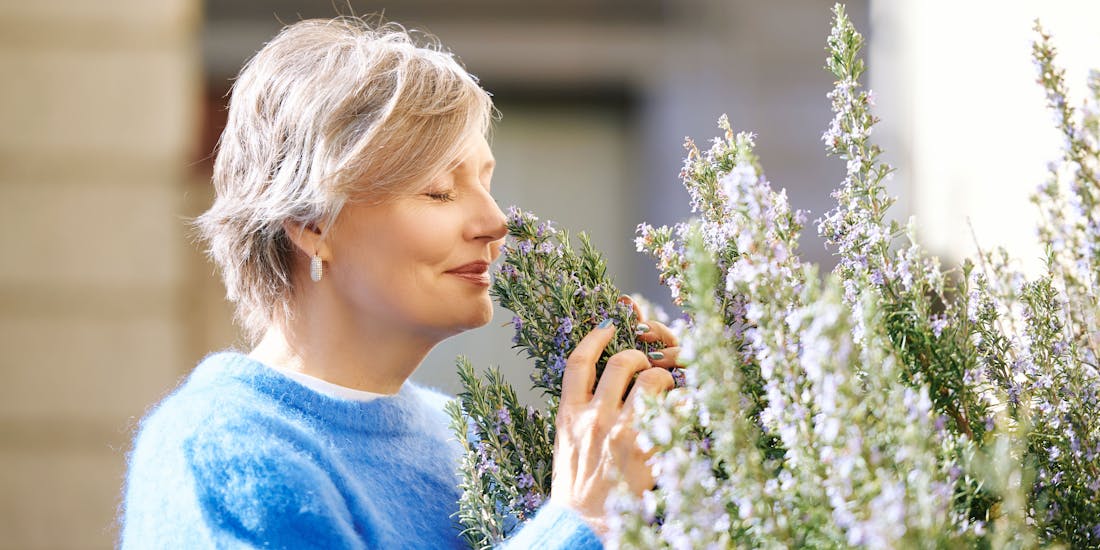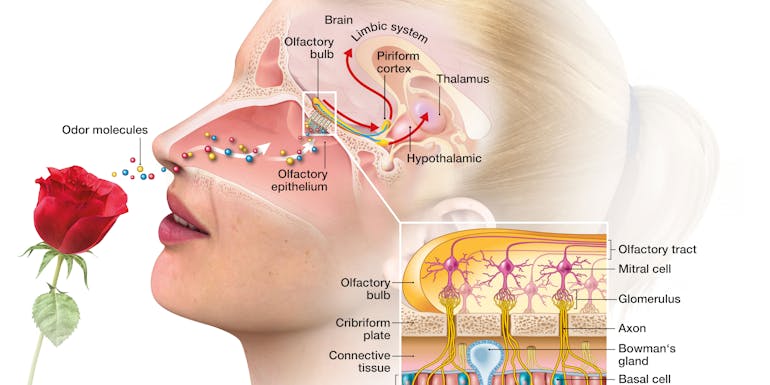
Nadine Walder, 31 July 2023
Aromatherapy
Effects of weather and humidity on your sense of smell
The sense of smell is one of our main senses. It enables us to identify and smell a variety of scents and aromas. From the enticing smell of freshly baked bread to the scent of a loved one, our olfactory system plays a decisive role in how we perceive the world around us. However, there are various factors that can have a positive or negative effect on our sense of smell, one of which is the weather. Read on to find out how the weather – and specifically humidity – can affect our sense of smell. To skip the whole theoretical part on connections and go directly to examples of practical applications, click here.
Read on to find out about:
- How our sense of smell works
- Effect of humidity on olfactory perception
- Further weather-related factors that affect our sense of smell
- Practical applications in the real world
How our sense of smell works
Before I look specifically at the effect of humidity and other weather conditions, I would like to start by explaining how our sense of smell works. The sense of smell – also known as olfactory perception or smell perception – plays a rather subordinate role in humans compared to other living creatures. Unlike the senses of sight or touch, we only really perceive the role of the sense of smell correctly and recognise how powerful it is when it is impaired by a cold, for example. Nevertheless, the sense of smell has important functions such as monitoring hygiene, conveying social information and triggering the feeling of repulsion as a warning that food has gone bad, for example.
The olfactory system consists of specialised cells that are located high up in the nasal cavity known as smell receptors or olfactory receptors. These receptors have the unique ability to recognise and process odour molecules and send signals to the olfactory bulb in the brain where olfactory perception takes place. The brain then interprets these signals and enables us to recognise and distinguish between different smells.
Effect of humidity on olfactory perception
Odour diffusion
Humidity can have a decisive effect on our olfactory experience. The effect of humidity on olfactory perception can be attributed in part to how it influences the movement and availability of odour molecules. In environments where there is a high level of humidity, the air is more saturated with water vapour which can lead to odour molecules mixing and spreading less. As a result, fragrances may be less intense and less perceptible in humid conditions.
However, dwell time also plays a role with regard to this. In environments where there is a high level of humidity, odour molecules can remain in the air for longer. This enables them to collect in certain areas and olfactory perception can be increased in these environments.
Volatility
Odour molecules are volatile, i.e. they dissolve in air as vapour. The rate of evaporation will depend on the vapour pressure of the odorant which is influenced by temperature and humidity. A higher level of humidity will reduce the volatility of certain compounds, making them less likely to evaporate and reach our olfactory receptors. This can lead to a reduction in the intensity of certain odours, making them less perceptible or more difficult to detect.
Sensory threshold
Humidity can influence the sensory threshold for olfactory perception. This relates to the minimum concentration of an odorant required in order for a person to perceive the odour. When humidity is low, more odour molecules remain in the gas phase and the concentration of odours in the air rises. Consequently, odours can be perceived more easily in dry air. A higher level of humidity can dilute the concentration of volatile compounds and raise the sensory threshold for perceiving certain smells. Therefore smells that were easy to identify in dry conditions become less perceptible in humid environments.
However, prolonged exposure to dry air can lead to a slight change in the mucous membrane as it becomes coated with a thin layer of mucus. This can cause a person’s sense of smell to be affected, in the same way as it is when you have a cold.
Personal sensitivity
People can react to smells with different levels of sensitivity due to personal factors such as genetics and state of health. Humidity can influence people’s sense of smell, with some being more affected than others.
Masking effects
Humidity can also have a masking effect on smells. For instance, some odours may become more pronounced in humid conditions (e.g. musty or mouldy odours) while others may become muted (e.g. floral or grassy scents). Certain smells may become less pronounced or sometimes even no longer perceptible when the humidity is high as other ambient smells or scents brought about by humidity can dominate our sensory perception. So different odour sources can be affected by humidity in different ways.
All in all, humidity can therefore affect how smells are transported, detected and perceived by people. The effect of humidity on olfactory perception can vary according to the specific odorant and individual sensitivity to smells in each case. In addition, other factors such as temperature and air pressure can also affect olfactory perception.
Further weather-related factors that affect our sense of smell
While humidity has a significant effect on our olfactory perception, other weather conditions can also influence our ability to identify scents.
Temperature
Higher temperatures can increase the volatility of odour molecules so that they disperse quicker in the air if the humidity is low at the same time. This increased volatility can lead to a more intense perception of smells as our olfactory receptors absorb a higher concentration of fragrance molecules.
Extreme temperatures – whether very hot or very cold – can affect our nasal sensory receptors. For example, cold temperatures can cause our noses to become blocked temporarily, reducing the air flow and possibly affecting our ability to smell. Likewise, very hot weather can lead to a dry nose which can also have an effect on olfactory perception.
Air pressure
Changes in air pressure can affect our sensory threshold and make us more or less sensitive to various smells. When the air pressure is low – during stormy weather, for example – some people may experience heightened sensitivity to odours while others may find that their olfactory perception is temporarily reduced.
Wind
Wind plays an important role in the transportation of odour molecules and can influence whether or not they reach our smell receptors. A strong wind can disperse odours over a larger area, making it more likely that we will perceive various smells. In contrast, a lack of wind can lead to local concentrations of smells.
Precipitation
Petrichor is the pleasant earthy smell produced when rain falls. It is created by a combination of factors including the release of oils from plants and the presence of certain bacteria in the soil. So rain can enhance olfactory experiences in connection with the environment and nature. Heavy rainfall can also have a masking effect on other smells, making it difficult to perceive certain smells while it is raining and shortly after it has rained.
Practical implications in the real world
Understanding how humidity affects our sense of smell has a number of practical implications. Here are a few examples:
- Wine tasting: Humidity can affect the aroma of wine. In environments with a high level of humidity, some wine aromas may be muted which can affect the tasting experience or lead to customers getting a surprise when they come to drink a wine that they have purchased at home.
- Perfumery: When creating fragrances, perfumers have to take humidity into account as the perceived intensity of a fragrance can vary depending on the environment in which it is used. A perfume that smells wonderful in a dry climate can have a less intense fragrance in a humid environment.
- Aromatherapy blends: Aromatherapists are able to carefully select essential oils according to their therapeutic properties and fragrance profiles. In areas where there is a high level of humidity, it may be necessary to use stronger or citrus oils to counteract any dulling of aromas. Conversely, in environments with low humidity, delicate floral or herbal oils can create a balanced and pleasant experience.
- Indoor air quality: Maintaining an appropriate level of humidity indoors can help optimise the olfactory experience, especially in environments such as restaurants or hotels where the perception of fragrances is of vital importance to the guest experience.
- Aroma diffusers and humidifiers: With aroma diffusers and humidifiers where you have the option to add essential oils manually, you can ensure that the fragrance is pleasant and not too strong or weak by changing the amount of essential oil that you add according to the level of humidity.
- Mobile aroma diffusers: Aroma diffusers are popular with travellers. By choosing essential oils to suit the local humidity conditions, travellers can create familiar and calming fragrances in their hotel rooms or travel accommodation and help make their trip relaxing and stress-free.
Incorporating the effect of humidity in real applications can enhance the olfactory experience and ensure that fragrances remain pleasant, consistent and effective regardless of the ambient conditions. We can use our understanding of this connection to enhance our appreciation and enjoyment of the sensory world of fragrances and aromas. Have fun discovering and trying out fragrances.
If you have questions related to indoor room climate, please get in touch with us. Or subscribe to our newsletter to regularly get informed about current topics regarding indoor climate, experience reports or Stadler Form insights.








